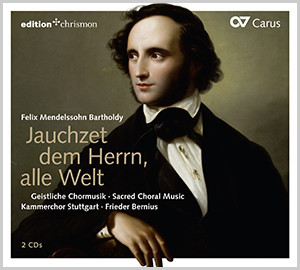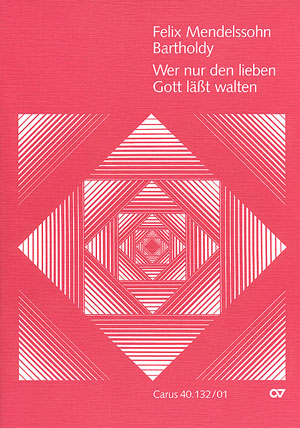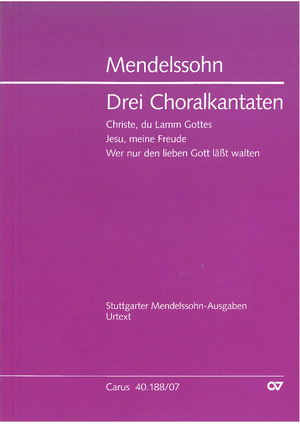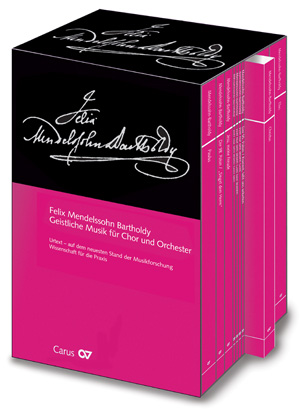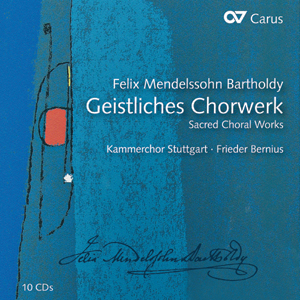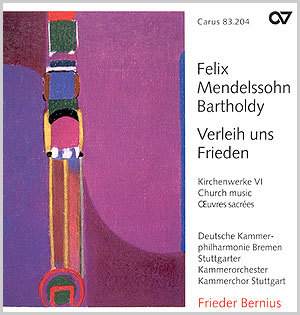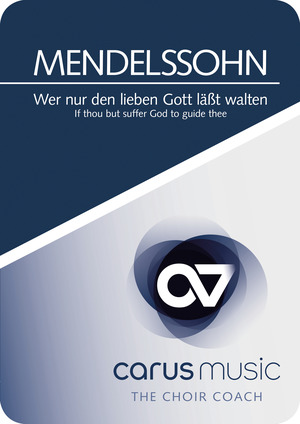
Mendelssohn’s intensive study of the works of Bach inspired him to compose some cantatas on chorale melodies. In the cantata "Wer nur den lieben Gott lässt walten", the second movement in particular poses some choral challenges: because the cantus firmus lies in the bass part, the usual foundation is missing in some places, and the other parts need to be all the more self-confident. In addition to this, the movement is structured in short sections and demands agile singing, looking ahead all the time. Secure knowledge of the part-writing and confidence are required!
Il suffit de s'exercer. Partout. A tout moment.
Que ce soit à la maison sur votre tablette ou votre PC ou en déplacement sur votre smartphone : avec carus music, the Choir Coach, vous avez toujours vos œuvres chorales avec vous pour vous entraîner ! Avec l'application chorale de carus music, vous pouvez écouter votre partition ainsi qu'un enregistrement de première qualité sur n'importe quel appareil et vous entraîner facilement à votre propre partie de chœur avec un coach. Avec carus music, la préparation de vos concerts est facile, efficace et amusante à maîtriser !
Performers: Sabine Ritterbusch (soprano) – Kammerchor Stuttgart, Stuttgarter Kammerorchester – Frieder Bernius
Contents
-
Composer
Felix Mendelssohn Bartholdy
| 1809-1847
-
Songwriter / Librettist
Johann Georg Neumark
| 1621-1681
-
Choir
Kammerchor Stuttgart
The Kammerchor Stuttgart is regarded as one of the best ensembles of its kind. Over its fifty-year existence, Frieder Bernius has developed the choir into an exceptional ensemble acclaimed by audiences and press alike. This has led to invitations for the choir to perform at all the important European festivals. In Germany the chamber choir performs at festivals and in concert halls in repertoire ranging from the 17th to the 21st century. Frieder Bernius and his ensemble have received numerous accolades for their contribution to new music. The Kammerchor Stuttgart has made over 80 CDs and LPs, numerous of which have been awarded international recording prizes (including the Edison award, Diapason d’or, Gramophone Choice, Classical Internet Award, International Classical Music Award, and German Record Critics’ Award prizes). The International Federation for Choral Music has invited the ensemble to sing at the 1st, 4th and 10th World Symposia on Choral Music in Vienna, Sydney and Seoul. Regular tours of North America and Asia since 1988 and a South America tour reflect the Kammerchor Stuttgart’s international reputation. Since 1984 the top ensemble has also been invited to Israel biennially. Personal details
-
Ensemble
Stuttgarter Kammerorchester
Founded in 1945, the Stuttgarter Kammerorchester is the oldest and most renowned ensemble of its kind and for over 65 years it has occupied an outstanding position in international orchestra culture. Michael Hofstetter has been the conductor of this ensemble since September 2006. The orchestra had already earned its excellent reputation under its founder and long-time director, Karl Münchinger. Through a completely new and exemplary style of interpretation of the works of Johann Sebastian Bach the Stuttgarter Kammerorchester became a pathfinder in the field of historical performance practice. Dennis Russell Davies, its principal conductor, from 1995 to 2006, expanded the repertoire of the orchestral, especially with works from 20th century. In 2008 the orchestra was awarded the European Chamber Music Award by the European Foundation for Culture. Personal details
-
Conductor
Frieder Bernius
| 1947Frieder Bernius’s work has earned great worldwide recognition. He is in demand internationally as a conductor and as a teacher. His principal artistic collaborators are the ensembles he founded himself, the Kammerchor Stuttgart, the Barockorchester Stuttgart, the Hofkapelle Stuttgart and the Klassische Philharmonie Stuttgart. As a guest conductor, he has collaborated repeatedly with, for example, the SWR Vokalensemble Stuttgart, the Deutsche Kammerphilharmonie Bremen, the Stuttgarter Kammerorchester and the Streicherakademie Bozen. Great stylistic versatility is Frieder Bernius’s hallmark. Whether he conducts vocal works by Monteverdi, Bach, Händel, Mozart, Beethoven, Fauré and Ligeti, stage music by Mendelssohn or symphonies by Haydn, Burgmüller and Schubert, his work always aims for a sound that is at once unmistakably personal and at the same time oriented towards the original period sound ideal. He devotes himself equally to the rediscovery of 18th century operas and to first performances of contemporary compositions. He is particularly interested in the musical history of southwestern Germany. Carus-Verlag has awarded Frieder Bernius a Golden CD for his complete recording of the sacred music of Felix Mendelssohn Bartholdy. The award was presented to him during the German Choir Festival in Stuttgart 2016. The sale of over 250,000 recordings, which has been acclaimed with a number of awards, has made a not insignificant contribution to what today is the obvious presence of Mendelssohn's complete œuvre in the concert repertoire. Personal details
-
Soloist - soprano
Sabine Ritterbusch
Frequent questions about this work
 There are no questions and answers available so far or you were unable to find an answer to your specific question about this work? Then click here and send your specific questions to our Customer Services!
There are no questions and answers available so far or you were unable to find an answer to your specific question about this work? Then click here and send your specific questions to our Customer Services!


